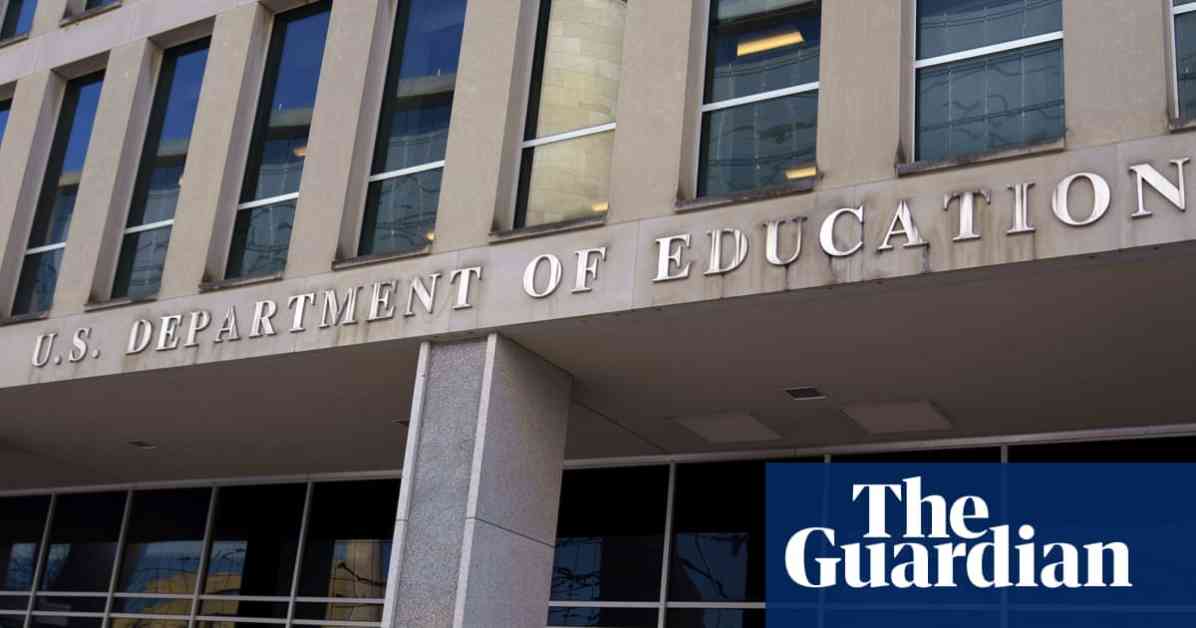In a recent development that has caught the attention of educators nationwide, the Trump administration has issued a stark ultimatum to schools and universities across the United States: eliminate diversity initiatives within two weeks or face the risk of losing crucial federal funding. This move by the administration is a significant escalation in the ongoing battle against what President Trump has deemed as “wokeness” in educational institutions.
The memo, released by the Department of Education last Friday, specifically targets the use of “racial preferences” as a determining factor in admissions, financial aid, hiring, and other areas within schools. Schools have been given a mere 14 days to cease any practices that result in the differential treatment of students or employees based on their race. The sweeping nature of this demand has sent shockwaves through campuses, threatening to disrupt all facets of operations, from the college admissions process to classroom instruction and campus organizations.
Craig Trainor, the acting assistant secretary for civil rights, emphasized the need to assess students based on merit, accomplishment, and character rather than race. This directive aims to address what the memo characterizes as widespread discrimination in education, particularly against white and Asian students. The guidance has already sparked a fierce backlash from civil rights groups and university organizations, with concerns raised about the ambiguous language that could potentially compel schools to abandon any initiatives related to diversity and inclusion.
Jonathan Fansmith, the senior vice-president of government relations at the American Council on Education, warned that the real intention behind the memo might be to instill fear and uncertainty, pushing schools to eliminate any programs that touch on racial issues, regardless of their legality. This latest move is an extension of President Trump’s executive order targeting diversity, equity, and inclusion programs, citing a Supreme Court decision that prohibits the consideration of race in college admissions.
Amidst the confusion and apprehension surrounding the implications of the anti-DEI order, the education department also announced a significant cut of $600 million in grants for organizations involved in teacher training. The rationale behind these reductions was to curb programs promoting what the department deemed as divisive concepts such as diversity, equity, and inclusion, critical race theory, and social justice activism.
The California School Boards Association has expressed a need for clear legal guidance to help schools navigate the looming deadline set by the Trump administration. Troy Flint, a spokesperson for the association, highlighted the lack of specific instructions for school districts, leaving them in a state of uncertainty about how to proceed in this new era of education policy.
The new guidance outlined in the memo directly impacts college admissions, emphasizing that colleges must refrain from using essays to predict a student’s race. This directive is in line with the Supreme Court’s stance on considering race as a factor in admissions, albeit with certain restrictions. Furthermore, colleges are prohibited from altering standardized testing requirements to achieve specific racial balances or increase diversity, posing a challenge for institutions that have moved away from standardized tests like the SAT and ACT in recent years.
Angel B Pérez, the CEO of the National Association for College Admission Counseling, raised concerns about the potential legal liabilities faced by colleges engaging in practices that have long been accepted within higher education. He noted that colleges are now caught in a difficult position where compliance with federal directives could have detrimental financial consequences.
Despite the widespread implications of the memo, some universities like Oregon State University remain confident in their compliance with existing laws. Rob Odom, the vice-president of university relations and marketing at Oregon State, affirmed that a legal review had confirmed the institution’s adherence to all state and federal regulations, providing a sense of assurance amidst the prevailing uncertainty.
The memo also appears to target scholarships based on racial backgrounds, prompting a legal debate about the extent to which the Supreme Court’s decision applies to financial aid. The National Association of Student Financial Aid Administrators expressed concerns about the potential impact on student aid, emphasizing the importance of providing clarity and certainty to students relying on financial assistance.
As the education landscape grapples with these unprecedented challenges, the broader implications of the Trump administration’s directive continue to unfold. With conflicting interpretations and legal uncertainties surrounding the memo, educational institutions are faced with difficult decisions that could have far-reaching consequences for students, faculty, and the future of diversity initiatives in academia.







